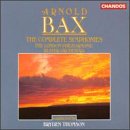| All Artists: Bax Title: Symphonies 1-7 Members Wishing: 0 Total Copies: 0 Label: Chandos Original Release Date: 1/1/2000 Re-Release Date: 10/26/1992 Genre: Classical Styles: Chamber Music, Historical Periods, Classical (c.1770-1830), Modern, 20th, & 21st Century, Symphonies Number of Discs: 5 SwapaCD Credits: 5 UPC: 095115890622 |
Search - Bax :: Symphonies 1-7
 | Bax Symphonies 1-7 Genre: Classical
|
Larger Image |
CD DetailsSimilarly Requested CDs
|
CD ReviewsBax Symphonies: Thomson/LPO/Ulster Orchestra K. Farrington | Missegre, France | 02/24/2000 (5 out of 5 stars) "This was a most welcome addition to my CD collection and Thomson has done a first rate job of putting together Bax's symphonic output on a five CD boxed set. Thew juxtaposition of the works is somewhat strange, the criterion being the optimal use of the 5 CD's time viz: disc's 2 and 3 split Symphony No 4 (movement 3 is put on disc 3) and the resulting disc 3 is somewhat 'funky' ro my mind with the Symphony No 2 carrying on after the Finale to No 4. I don't want to sound churlish given the quality of the music but I would have like to have seen Chandos give us an additional disc on the set so that all the symphonies would have had their own disc with the exception of disc 1 which would contain Symphonies 1 & 6 al completo, thereby avoiding this artificial splitting. I would have been happy to pay the extra money which would have saved me a lot of messing about with my CD programmer! I generally agree with the comments of the earlier commentator on the music although I would advise any true lover of this music to also listen to the 1960s/70s issue of the Symphonies (minus 3 &4) on the Lyrita label which is not currently available on CD. To listen to the Thomson's recording of Symphonies No 1 and 2 we can pick up the truth of Bax's words when he said that his best symphonies were his early works Nos 1-3. He thought he had burnt himeslf out after the early 1930s. His original programme notes called No 1 'Adventures on the precipice' and of No 2 'In the abyss'. To be sure, the modern Thomson recording is technically brilliant matching his performance as he picks up the pagan power of these works, the brass sforzandi shattering the grim smoky beginning of No 2 and the cold glittering tone colour of the celesta ostinati against the baleful horn's call somehow summoning up the legends of Cuchulainn and the Nordic Sagas. The Lento with its leading violin tells us a sad Celtic story builds to a shimmering climax like the wind off the West Irish coast leads us into the terrifying finale with its uncanny predictive assembly of a thermo-nuclear catastrophe with boiling skies and an Epilogue which asks: What now? The feeling at the end of this magnificent work is that we have been told a Saga of bravery, fortitude, suffering and death. The version of Symphony No 3 is the best yet I have heard, certainly preferable to the Naxos offering which to my mind is sometimes taken too fast. The Symphony No 4 was written when Bax was attempting to write music of a more extrovert nature and the first movement bears this out, although the slow movement despite its lyricism appears somehow artificial and hollow when compared with the more heartfelt and original No 1, for example. The strident finale, with its trumpet and percussion fff is of the genre of his 'Music to a Picaresque Comedy', is truly delightful and Thomson makes the most of this unusual mood in Bax, making the orchestra jump through the loudspeakers! The 5th and 6th symphonies are brilliant, the spectre of Sibelius presenting itself as Bax's music became more terse and economical. However, as non plus ultra, Thomson pulls a gem out of his hat with No 7, this CD is given its own jewel case in the box and it seems appropriate as this is the most played symphony of my set and played such is a veritable jewel. This is manifest in the multitude of layers of orchestration, harmony, beat and counterpoint which are here displayed in showcase fashion. The closing of the first movement with its uncanny sad woodwind lament against discordant muted trombones chords summon up a sense of disquiet and unease as we drift unhappily into the next movement as a storm brews under dark skies. The section of the next movement was marked by Bax 'In Legendary Mood' and is wonderfully dark, mysterious and sensual. The CD collection comes to a soulful and pensive close which portrays Bax's words as his alter ego the poet, Dermot O'Byrne: 'Dark are the paths of my heart...and sea winds blow the winter in'; a must buy for all British Music fiends and a delight for any lover of post Wagnerian romantic emotion." The Essence of Sir Arnold Bax David A. Hollingsworth | Washington, DC USA | 03/28/1999 (5 out of 5 stars) "Sir Arnold Bax (1883-1953) was the leading British composer in the 1930s after his reputation grew immensely due largely to the 1922 premiere of his powerful, agonizing First Symphony. Although his Symphonic Poems such as Tintagel (1908), the Garden of Fand (1916), & November Woods (1918) placed Bax among the recognizable of composers, his symphonies did more to further his reputation.His first symphony (1921-1922) has it's relations to Myaskovsky's symphonies no. 6 & 16, Glazunov's Eighth symphony, Vaughan Williams' Sixth symphony & Nielsen's Fourth & Fifth symphonies because it is reflective of the tragic past. In Bax's case, he witnessed the Eastern Uprising of 1916 in Ireland (against British forces) which resulted in killing of many of Bax's friends. His father past away two years later. The symphony's first movement is energetic, expressive, yet dark & angered. The second movement is elegiac, powerful & morbid, probably the most moving of all of Bax's compositions. The Finale, with all it's struggles, ends in bright optimism. The Second symphony (1924-1926) returns to the tragic past of the composer. It employed a greater orchestral force than it's predecessor (with the organ included). Of all works of the composer, this symphony is the most powerful & pessimistic, ending in quiet contemplation. The turning point in Bax's life is represented in his Third symphony (1928-1929), where some misfortunes were not forgotten, but where there's still life & hope. The first two movements are brighter, beautifully scored, & evocative. The last movement is with some sort of gaiety & festivity before the magically Epilogue appears. The epilogue of the symphony at last had a peaceful ending that is not of a tragic nature. The Fourth & Fifth symphonies (1930 & 1932 respectively) showed the more brighter side of the composer. The Fourth depicts the sea (like his Seventh & Tintagel) whereas the Fifth (dedicated to Jean Sibelius, who, with Sergei V. Rachmaninoff, admired Bax) depites optimistic energy (The Finale's Epilogue with its triumphant, festive spirits & the breathtaking slow movement with wonderful imagination & highly attractive orchestration). The Sixth symphony (1934-1935) begins with the theme which repeats itself insistently before the Allegro con fuoco enters. The movement began with coldness, but with passion, and passion predominates the entire first movement before the climax is heard. The movement ends boisterously. The second movement is both lyrical & calm whereas the last movement, as long as the first two movements, begins with an appealing clarinet solo theme, used again later. After the clarinet, the strings enter to repeat the theme already established. The pace quickened to a lively scherzo where themes becomes varied. After the grandious climax, we have now, the Epilogue, as magically as the one in the Third symphony although slightly more disturbed.The Seventh & last symphony was completed in 1939 as a commisioned work for the New York World Fair of 1939. It was dedicated to "The People of America" & was premiered by Sir Adrian Boult. The first movement begins quietly before liveliness & majesty take over. The movement is festive & passionate, ending quietly as it began, with a timpani roll & the theme played by the clarinet. The slow movement is meditative & appealing whereas the finale begins with triumph. That triumph would soon be replaced by a sober, saddening theme played by first the lower strings & then by brass & woodwinds. Seven variations follows, the first six of them active, boisterous, & perhaps pompous. The calm & serene seventh & last variation is perhaps the saddest of all of Bax's music, saying goodbye to the end of the epic journey the symphonies carried Bax & us as we relate to this great composer.Bax was autobiographical in his compositions. He, like Carl Nielsen, Myaskovsky, Lyatoshynsky & Josef Suk, was very communicative & personal without regrets or apologies. The composer was imaginative & honest, with impeccable orchestration & craftmanship. Bryden Thomson with The London Philharmonic & Ulster Orcestra did Bax the greatest of justice in bringing his works from the cold & unfortunate obscurity. The performances: passionate, majestic, sympathetic, beautiful. The recording: atmospheric & perfect. Should we hope for further recordings of Bax with the Scottish National Orchestra under David Lloyd Jones, who so far recorded Bax's First symphony with passion & a sense of urgency & excitement?The set is highly recommendable nevertheless." Some good and great stuff...But be patient Vikram Ramanathan | 12/05/2003 (4 out of 5 stars) "
I never knew about Bax and suddenly I am listening to his complete symphonies. The symphonies are a great tome of classical music , but you would call it great only after you have listened to all the symphonies, at least a couple of time. The set of symphonies consist of unconventionally large time scales, big bursty orchestration followed by pianissimo passages, sudden solos entering after orgasmic full blooded orchestra all happening in between chunks of large tone poems sections. All this makes for a pretty unwieldy work at first hearing, but when you have listened to it, you feel this is the best way it should sound. There is music which is great sounding at first hearing and then gathers dust, and there is music which is a bit hard to like at first hearing, but once the trouble is taken and the terrain is charted, it doesnt seem incomprenhensible anymore, infact it ends up becomming your most fav music. Baxs synmphonies fall in the 2nd category. The Music at times sounds like Prokofiev, sometimes like Shostokovich and at times like Bax. But its a unique blend. The orchestration sound produced by BAX is fantastic. He puts a very quite instrument solo just after crash boom bang. And the music does not follow formal structure, it meanders, but its fantastic sounding. Sym5 and 6 will take time ..you need to hear it 2-3 times Sym 1 and 2 sounds a bit peasantly, but bit more hearing and you like it. Sym 1 and 2 have a faustian character sym 3 and sym 7 are by far the BEST in the set. Sym 7,3 and 4 is easily approchable, you will like these three at first hearing. For the rest, give your ears and your cd player some more re-runs of the cds and you will start loving them. regards, Vikram" |

 Track Listings (6) - Disc #1
Track Listings (6) - Disc #1
